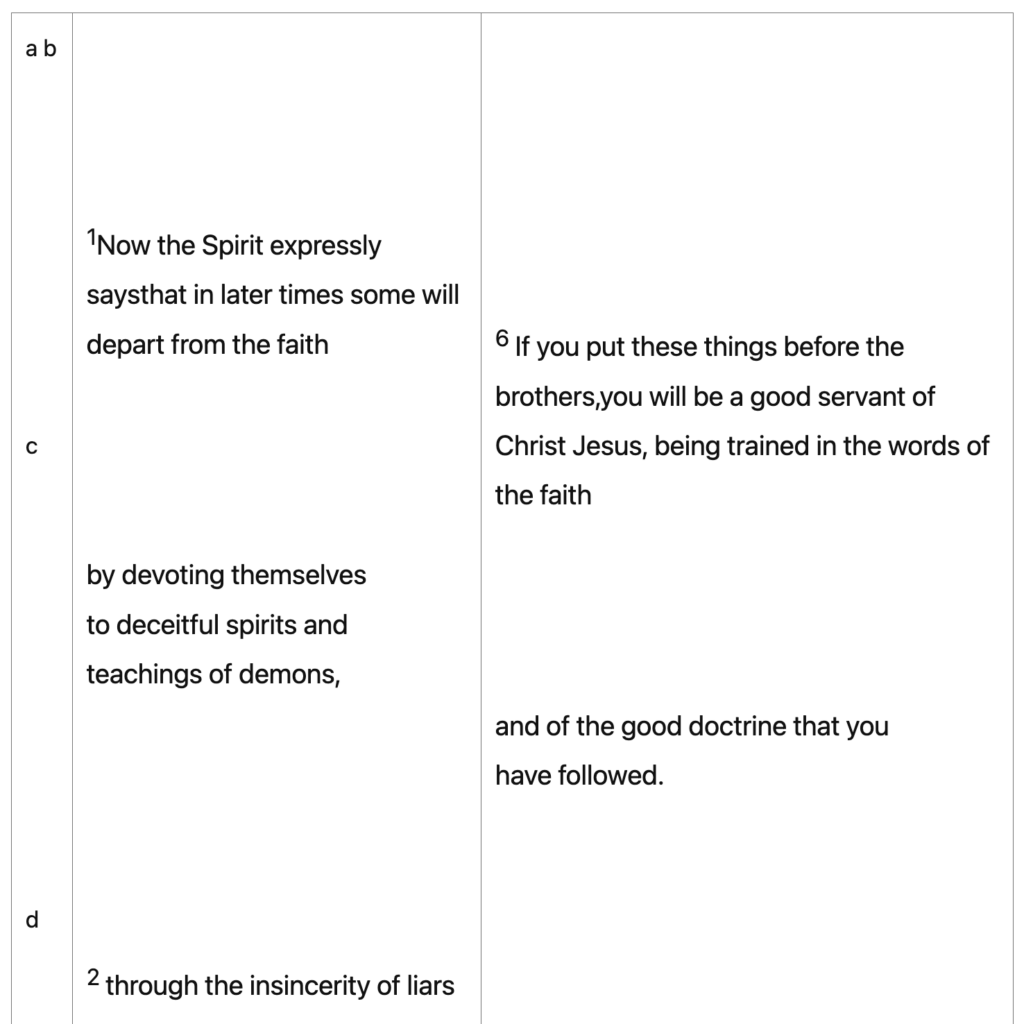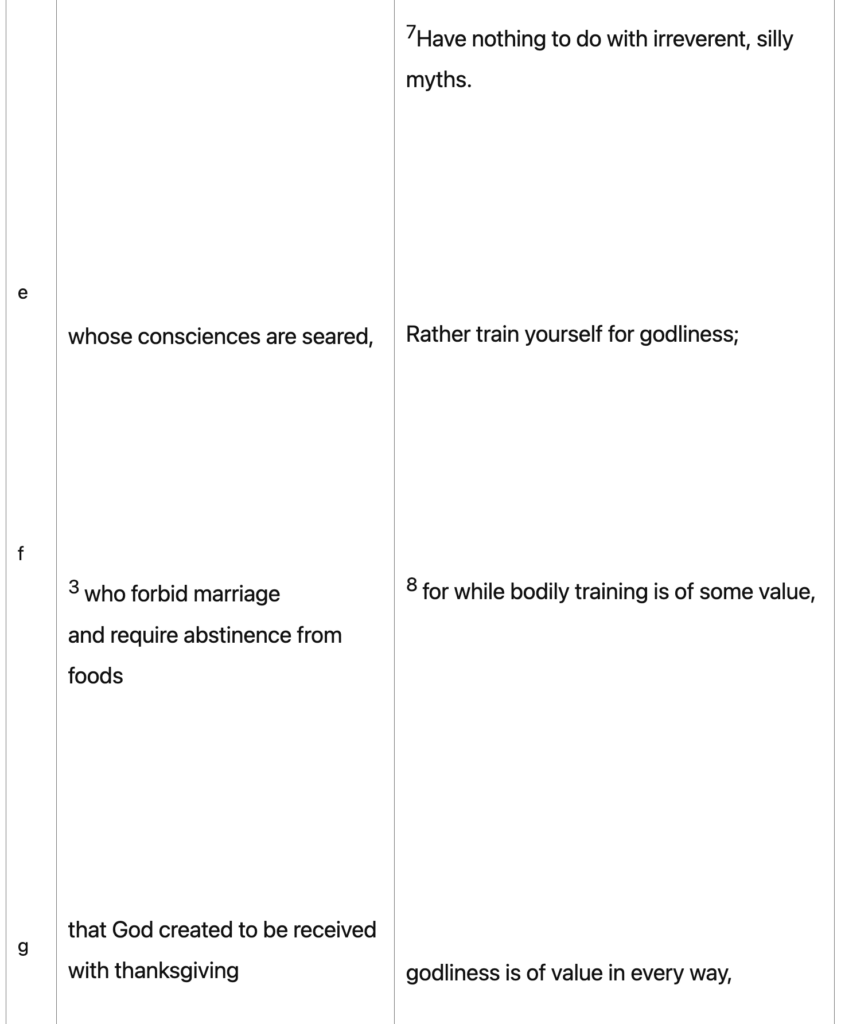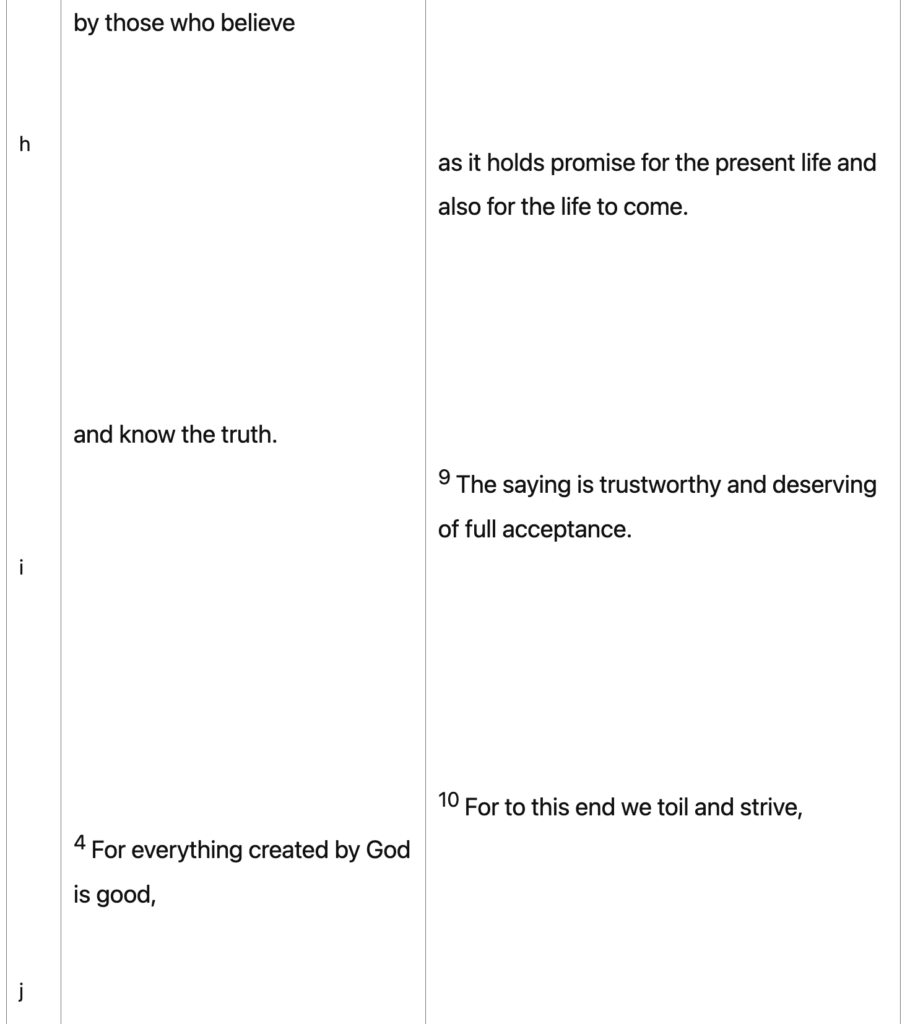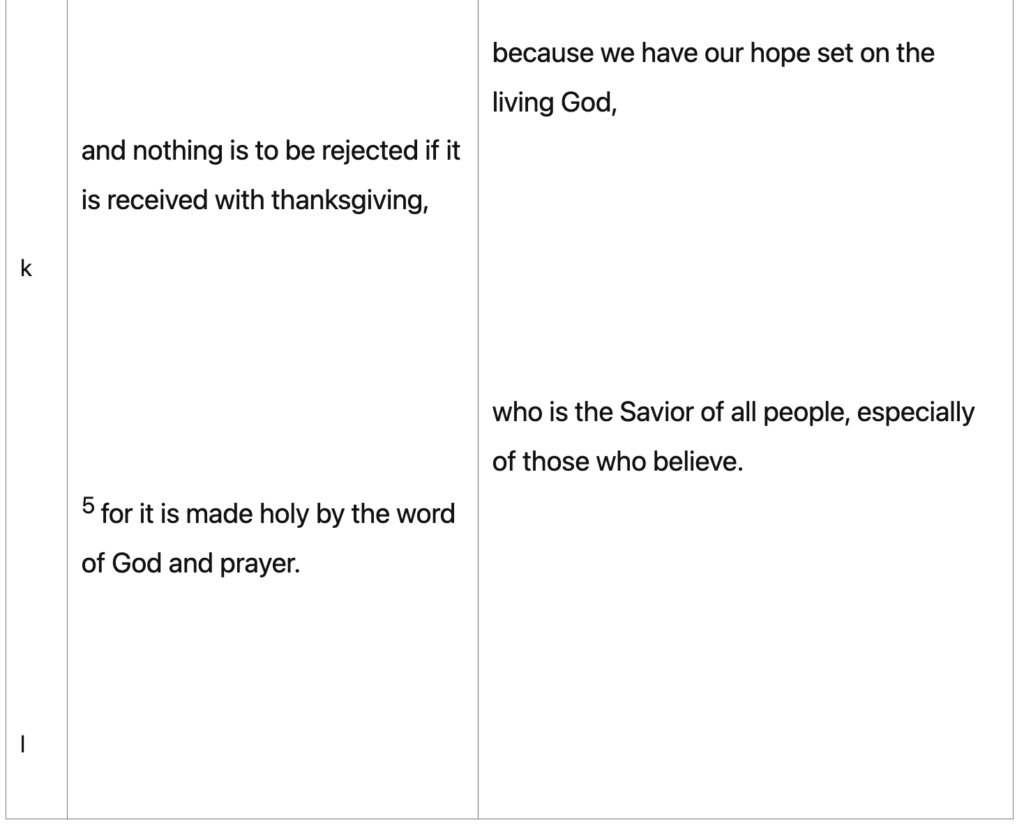In the first installment of this essay, I offered the following chiastic outline of 1 Timothy:
A. 1:1-2. Paul greets Timothy as a true child of the Faith, and blesses with grace, mercy, and peace.
B. 1:3-7. Timothy is urged to command against heresy.
C. 1:8-11. The reason the Law is established. List of sins.
D. 1:12-17. Jesus came to save sinners. Doxology.
E. 1:18-20. Wage the good war.
F. 2:1-8. Pray, lifting up holy hands without anger or quarreling.
G. 2:9-15. Instructions to women.
H. 3:1-7. Concerning bishops.
I. 3:8-13. Concerning deacons and deaconesses.
J. 3:14-16. Instructions to Timothy as a pastor in the Household of God.
K. 4:1-5. Heresies will arise.
K’. 4:6-10. Teach against heresies.
J’. 4:11-5:2. How Timothy should conduct himself as a pastor.
I’. 5:3-16. Concerning widows.
H’. 5:17-25. Concerning elders.
G’. 6:1-2a. Instructions to bondservants.
F’. 6:2b-11. Against heresy caused by envy and greed. Quarrelling.
E’. 6:12. Fight the good fight.
D’. 6:13-16. Keep the commandment. Doxology.
C’. 6:17-19. Store up treasure with God, so to take hold of true life.
B’. 6:20-21a. Timothy commanded to guard against heresy.
A’. 6:21b. Grace.
I continue my analysis of the structure with the F and F’ sections.
Paul begins sections F (2:1-8) and F’ (6:2b-11) by urging or commanding Timothy to urge certain things. In F Paul urges prayer for those in high places; and in F’ Paul says that those who disagree with the “teaching that accords with godliness” are “puffed up with conceit” and without understanding. It’s a frightful thing that an arrogant man void of understanding in 6:3-4 is often so arrogant because he is in high places. It’s fitting that we should remember to pray for all of our leaders in every area, whether church, state, or other organizations; that they would “agree with the sound words of our Lord Jesus Christ and the teaching that accords with godliness.”
These arrogant heretics crave controversy and “quarrels about words,” Paul says, “which produce envy, dissension, slander, evil suspicions, and constant friction among people.” This is the opposite of what Paul says is the goal for the lives of Christians: in F, he says we should pray for those in high places so we might live a “peaceful and quiet life, godly and dignifies in every way.” If arrogance leads to quarrels and all manner of ungodliness and disunity, what must we be in order to live “godly and dignified in every way”? We must be humble. The humble man prays, that is, he trusts in God.
In F, Paul goes on to make mention of how God “desires all people to be saved and to come to the knowledge of the truth”; and in F’, Paul goes on to further characterize these arrogant heretics as being “depraved in mind and deprived of the truth.” Meanwhile, back in F, Paul inserts a statement to assure Timothy he is not lying, but telling the truth about his own authority as an appointed Apostle and teacher of the truth.
Another connection can be made between Paul’s statements about Jesus being our Mediator and Ransom in F, with his statement in F’ about the arrogant heretics “imagining that godliness is a means of gain”: Godliness isn’t a means of gain, since no level of merit can be obtained; rather, Jesus paid the ransom for all. F begins and ends with prayer, prayer that gives thanks to God, is content (6:6 “But godliness with contentment is great gain”) and doesn’t get angry and quarrel (1:8 “lifting holy hands without anger or quarreling”, 6:9 “but those who desire to be rich fall into temptation, into a snare, into many senseless and harmful desires that plunge people into ruin and destruction”). In F’, by contrast, Paul speaks of greed, which is neither thankful nor content, and which is “a root of all kinds of evils.” Lastly, in F (1:8), Paul says he desires men to pray; and in F’ (6:11), Paul addresses Timothy as “O man of God.” So Timothy, especially as a pastor and teacher in the Church, as well as all leaders and teachers in the Church, should “in every place . . . pray, lifting holy hands without anger or quarreling,” pursuing “righteousness, godliness, faith, love, steadfastness, gentleness.”
The connections between G (2:9-15) and G’ (6:1-2a) are obvious enough. G is instructions concerning women; G’ gives instructions concerning bondservants. See, in G, women are told to be modest and self-controlled, godly, learning in quiet submissiveness to their own husbands. They are not to teach or exercise authority over a man. In G’, we also have the theme of submissiveness, this time in regard to bondservants. Bondservants are to honor their masters so that the Name and teaching of God be not despised. Here we see “teaching” mentioned and in G women are instructed to learn with submissiveness. The connection isn’t that women are slaves subject to their master-husbands. Rather the connection is that both passages speak to those who in one way or another are in subjection to some authority or head.
Paul gives Timothy instructions about pastors in H (3:1-7), and in H’ (5:17-25), about elders. H gives the qualifications or requirements for pastors. But H’, instead of giving the qualifications for elders, as would be expected, deals with how elders are commended or condemned. These two sections complement one another. The qualifications for a pastor ought to be applied to elders; and likewise, how an elder is handled, whether for commendation or condemnation, ought to be applied to pastors. This is corroborated by Titus 1:5-9, where Paul lists qualifications for elders (and pastors) which is similar to the list here in 3:1-7. Both sections, H and H’, end with mention of outward appearances: in H, pastors are to have a good reputation among outsiders; and in H’, Paul assures Timothy that if not now, then later, all sins and good works will be made know, so he need not try to judge elders’ hearts. A tree is known by its fruit.[1] This reminds us of what we said when looking at sections D and D’ that “judgment is coming.” and yet again we are reminded of 70 AD, and of the letters to the angels of the seven churches in Revelation where King Jesus warns of his coming to judge the pastors and their churches.
Sections I (3:8-13) and I’ (5:3-16) seem an unusual pair. I is concerned with deacons and deaconesses, I’ with “enrolled” widows. There are a couple preliminary connections: first, that deaconesses and widows are female; second, that there is mention of sins of the tongue in both sections: “double-tongued” and “slander” in I, and gossip in I’. The main connection is with the type of role deacons, deaconesses, and widows seem to have in the Church. It would seem that the seven of Acts 6, which includes Stephen, were the first deacons. Deacons, as the title suggests,[2] are waiters, servants, which is what the seven of Acts 6 were ordained for – serving the Greek widows who “were being neglected in the daily distribution.” Deaconesses, then, would have had a comparable role among the women of the Church. In I’, the “enrolled” widows seem to have a similar function: “She who is truly a widow, left all alone, has set her hope on God and continues in supplications and prayers night and day. . . . Let a widow be enrolled if she is not less than sixty years of age . . . having a reputation for good works: if she has brought up children, has shown hospitality, has washed the feet of the saints, has cared for the afflicted, and has devoted herself to every good work.” And so, deacons, deaconesses, and enrolled widows are various positions within a broadly defined diaconate.
Timothy is a true child of the Household of God, and in J (3:14-16), Paul charges him to be sure he behaves in accordance with that truth. In J’ (4:11-5:2), Paul does the same thing. The connection with the reference to the Household of God in J is found at the end of J’ where Paul instructs Timothy to treat the men of the church as fathers and brothers, and the women as mothers and sisters. The Church is the Family of God. Jesus says as much when he tells Mary Magdalene to report to “my brothers” that “I am ascending to my Father and your Father.”[3] J starts with Paul saying that he is writing to Timothy in order to instruct him; J’ begins with Paul instructing Timothy to instruct others. Then, in J, Paul says he writes to Timothy so he will know how to conduct himself in the Household of God; and in J’, Paul gives instructions to that effect. Paul summarizes the Gospel in J; and in J’, Paul tells Timothy to read the Scriptures, exhort, and teach, and he says to guard the teaching of the Gospel. A last connection: in J, Paul refers to the summary of the Gospel as “the mystery of godliness”; and in J’ Timothy is told to conduct himself “in purity” both at the beginning and the end of the section. Timothy is to be pure in his faith and teaching of the Gospel, which is intimately connected with godliness and purity in his conduct. Timothy is to not only trust and guard the Christian Faith, but also to live that Faith out. True purity in belief, is true purity in godliness; and that cleansing for purity only comes through the Savior who shed His blood for our cleansing and the Gospel which He proclaims in His Name.
And now we get to the heart of the Epistle: K (4:1-5) and K’ (4:6-10). These passages match up as follows:




Let’s examine the connections in some detail. With the first lines, a, the connection is between the Spirit and the brothers. As we learn from Romans 8:15, the Holy Spirit bears witness to our adoption into the Household of God. So, what “the Spirit expressly says” ought very well to be “put . . . before the brothers” – what the Spirit says is a witness to the Truth for the Brethren. Furthermore, the Communion of the saints is the Temple of the Holy Spirit.[4] The Spirit dwells in and between the members of the Household of God. And those who remain faithful in the Household, being enculturated by the Word of the Faith, are contrasted here by Paul with those who faithlessly leave the Household (b). These fall away from the Faith because they have turned aside to demonic doctrines, whereas the faithful live according to the “good doctrine” (c). These false-children trade the Truth of God for lies, but the legitimate children of the Household of God won’t have anything “to do with irreverent, silly myths” (d).
While the faithless bastards are cauterizing and branding their consciences with the mark of the beast, the true children are training themselves in godliness (e). These heretics, while forsaking the heart of the Law,[5] train their bodies, but not their hearts, refusing to give God thanks; but the faithful, though not gnostically throwing their bodies into perversity, practice godliness, giving thanks to God for all things, believing in the Truth of God, trusting in the promise of resurrection now in Christ and physically unto life everlasting on the Last Day (f, g, h).
“Everything created by God is good”, and when received by thanksgiving, is fully acceptable: even strife and suffering is good for those who believe and have set their hope on the Living God, because for them it is a good gift from God “the Father of lights” from whom comes down “every good gift and every perfect gift”,[6] and nothing from His hand is to be rejected (j, k). And so those who remain true in the Household of God, believing in the salvation they have in Christ Jesus, “know that for those who love God all things work together for good, for those who are called according to his purpose”;[7] for our loving Father does all things in accordance with His holy Word, in answer to the prayers of Jesus and ours. In this we surely have our Hope: that Jesus is the Savior now and forever “especially of those who believe”.
In the final installment of this essay we will look at the theme of 1 Timothy and at who these heretics are.
Joseph Norris is pastoral intern at Trinity Presbyterian Church, Birmingham, Alabama.
NOTES
[1] Luke 6:43-45.
[2] Greek: diakonos, meaning servant, messenger, attendant, official, waiting-man, runner.
[3] John 20:17.
[4] 1 Corinthians 6:19-20; 1 Peter 2:4-6.
[5] Matthew 23:23.
[6] James 1:17.
[7] Romans 8:28.
